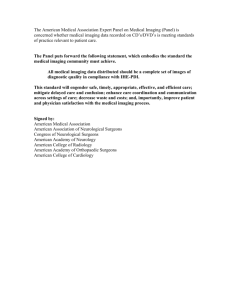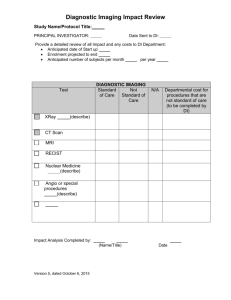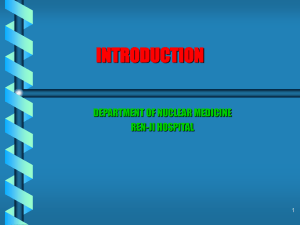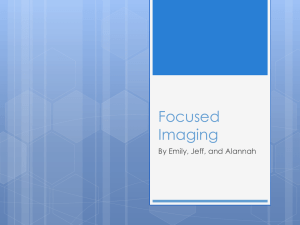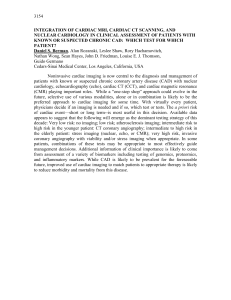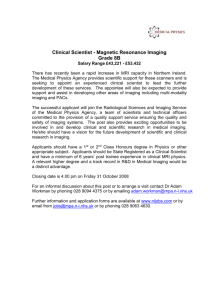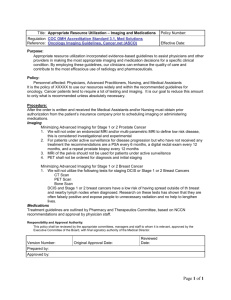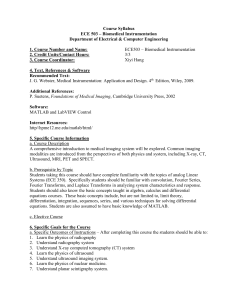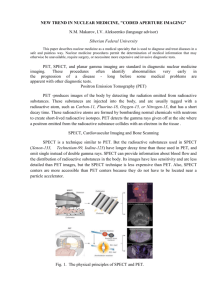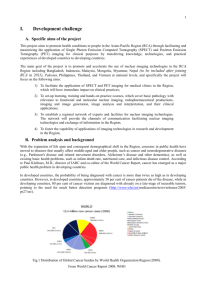1- Nuclear Cardiology
advertisement
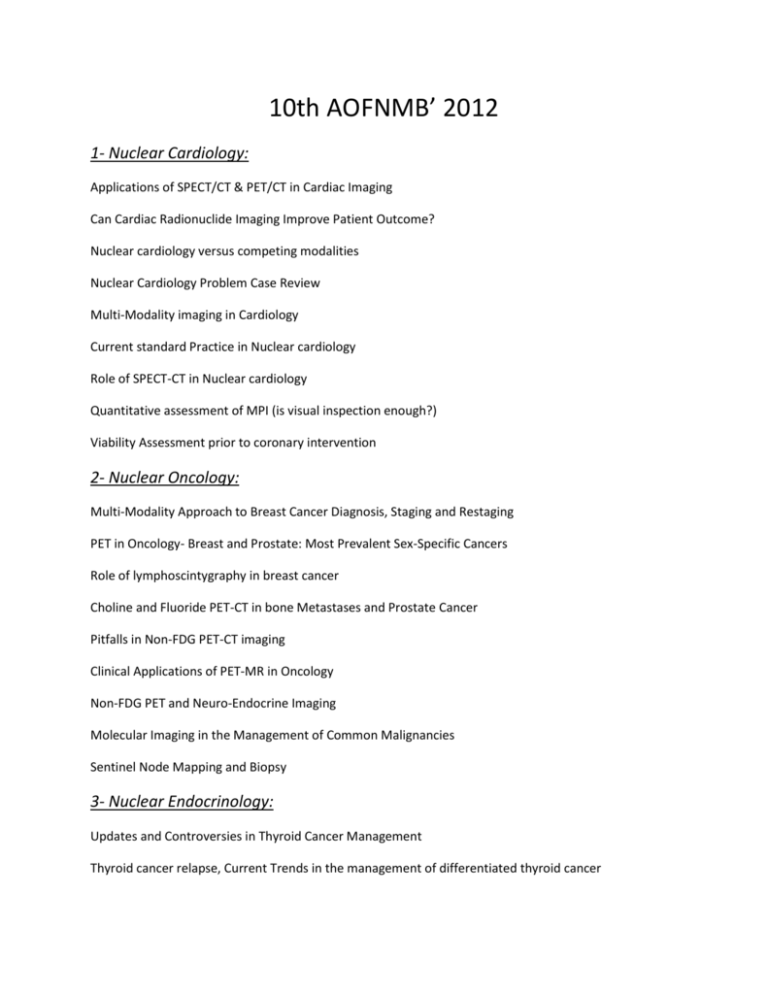
10th AOFNMB’ 2012 1- Nuclear Cardiology: Applications of SPECT/CT & PET/CT in Cardiac Imaging Can Cardiac Radionuclide Imaging Improve Patient Outcome? Nuclear cardiology versus competing modalities Nuclear Cardiology Problem Case Review Multi-Modality imaging in Cardiology Current standard Practice in Nuclear cardiology Role of SPECT-CT in Nuclear cardiology Quantitative assessment of MPI (is visual inspection enough?) Viability Assessment prior to coronary intervention 2- Nuclear Oncology: Multi-Modality Approach to Breast Cancer Diagnosis, Staging and Restaging PET in Oncology- Breast and Prostate: Most Prevalent Sex-Specific Cancers Role of lymphoscintygraphy in breast cancer Choline and Fluoride PET-CT in bone Metastases and Prostate Cancer Pitfalls in Non-FDG PET-CT imaging Clinical Applications of PET-MR in Oncology Non-FDG PET and Neuro-Endocrine Imaging Molecular Imaging in the Management of Common Malignancies Sentinel Node Mapping and Biopsy 3- Nuclear Endocrinology: Updates and Controversies in Thyroid Cancer Management Thyroid cancer relapse, Current Trends in the management of differentiated thyroid cancer Imaging modalities for neuroendocrine tumors Is There Yet a Role for Octreoscan in the PET Era? 4- Nuclear Neurology: Early diagnosis of Alzheimer’s disease Brain Perfusion SPECT in Schizophrenia Role of Brain Perfusion SPECT prior to brain surgery for epilepsy Differential Diagnosis of Parkinson’s disease with F-DOPA PET 5- Nuclear Gastroenterology: Role of PET CT in GI malignancies Esophageal Transit and GE Reflux Evaluation Gastric Emptying Scintigraphy Role of Liver and Spleen Imaging in HCV+ patients Hepatobiliary Imaging in emergency room 6- Nuclear Urology & Nephrology: DMSA in post pyelonephritic status Renal perfusion scans in ESRD Diuretic Renography versus Ultra sonography GFR estimation methods 7- Skeletal system: Role of 3phase bone scan, Ga-67 SPECT-CT, Labeled WBCs in Osteomyelitis Is there a role for conventional bone scan in PET era? Non-neoplastic Osseous Disorders 8- Hybrid Imaging: CT Imaging: Thoracic, Abdominal and Pelvic Imaging, Review of Cross-Sectional Anatomy, Common Pathological Entities ,CT Case Review Imaging, Review of Cross-Sectional Anatomy (Abdomen) 9- General Nuclear medicine: Standardization in Nuclear Medicine Is There a Role of Nuclear Medicine in Emergency? New Trends in Molecular Imaging Radionuclide Therapy and Peptide Receptor Radionuclide Therapy 10- Pulmonary System: Approach to Solitary Pulmonary Nodules with PET and CT, Case review, pearls and Pitfalls Complementary role of PET-CT in SPN, Cost effectiveness Ventilation/Perfusion SPECT Pitfalls and difficulties in the interpretation of FDG PET CT in lung cancer 11- Inflammation and Infection: Assessment of Inflammation and Infection by SPECT and PET radiotracers FUO assessment, Role of Ga-67 and FDG-PET Diabetic foot a diagnostic dilemma even with FDG-PET 12- Pediatrics: PET-CT applications in pediatric patients Role of DRNC and DMSA scan post UTI status in children 13- Radiopharmacy and Radiochemistry: New radiotracers in molecular imaging Advances in therapeutic radiopharmaceuticals Facing Tc-99m shortage worldwide Mo-99 production and alternatives for Tc-99m radiopharmaceuticals Non-FDG PET radiopharmaceuticals Radiopharmaceuticals based on Immunomolecules and peptides Ga-68 Generator: Radiochemistry and dosimetry Radiopharmaceutical preparation and quality control 14- Physics & Instrumentation: Reconstruction and Analysis, Filter back projection method versus iterative analysis New horizons in Image fusion Hybrid imaging Simulation of nuclear medicine procedures Preclinical Imaging in nuclear medicine Multimodality Imaging Role of radiation biologist in general population dose reduction 15- Nursing staff and technologists: Routine SPECT protocols Current SPECT-CT methods in oncology and nuclear cardiology Techniques in PET- CT, Patient preparation for FDG imaging in oncology Patient’s dosimetry and optimal radiation protection methods for patients, staff and general population Basic principles of patients care Imaging artifacts and Gamma camera quality control Optimal acquisition methods in current nuclear medicine scans
